Nursing and Stress Management l Assignment
VerifiedAdded on 2022/09/15
|8
|1974
|18
Assignment
AI Summary
Contribute Materials
Your contribution can guide someone’s learning journey. Share your
documents today.
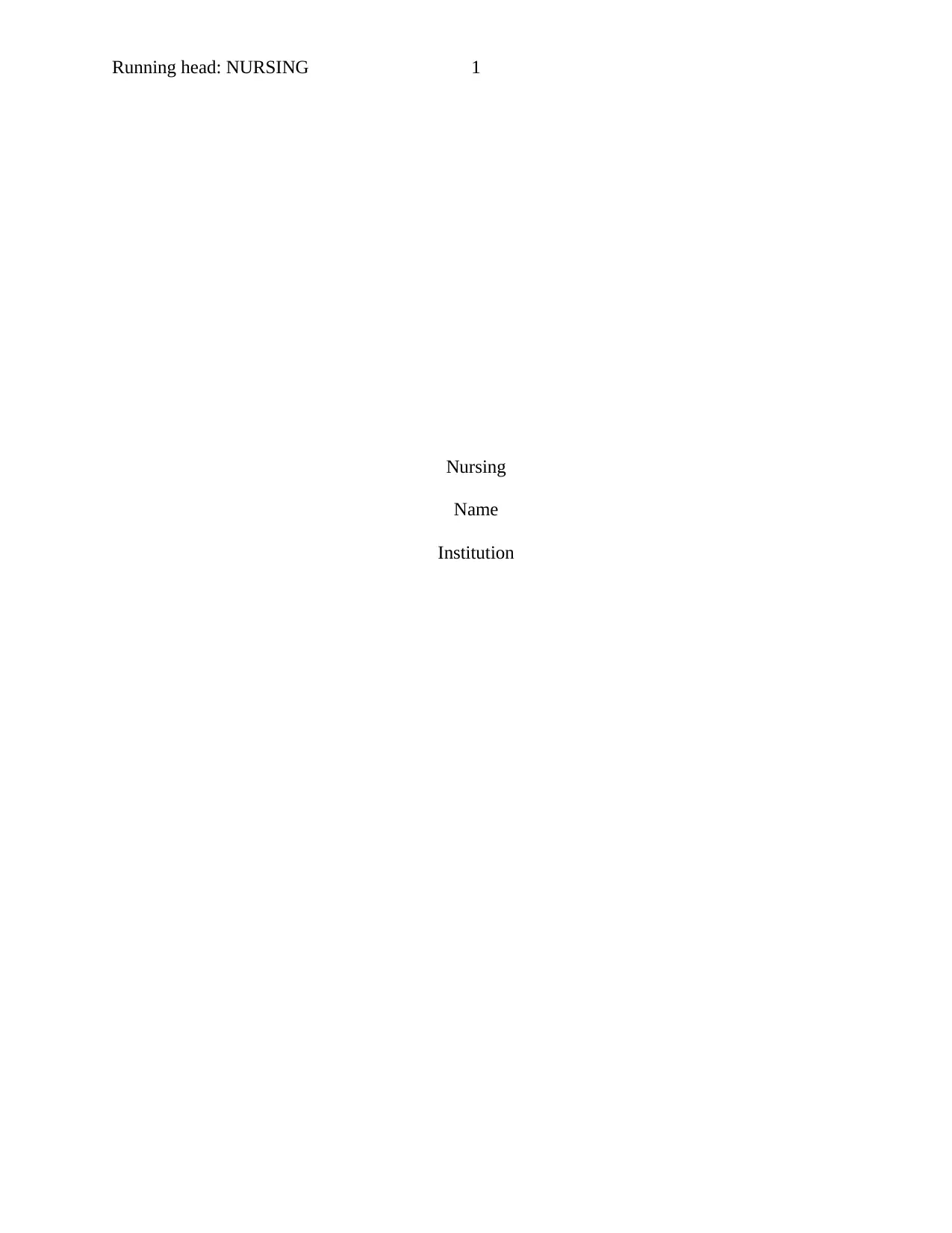
Running head: NURSING 1
Nursing
Name
Institution
Nursing
Name
Institution
Secure Best Marks with AI Grader
Need help grading? Try our AI Grader for instant feedback on your assignments.
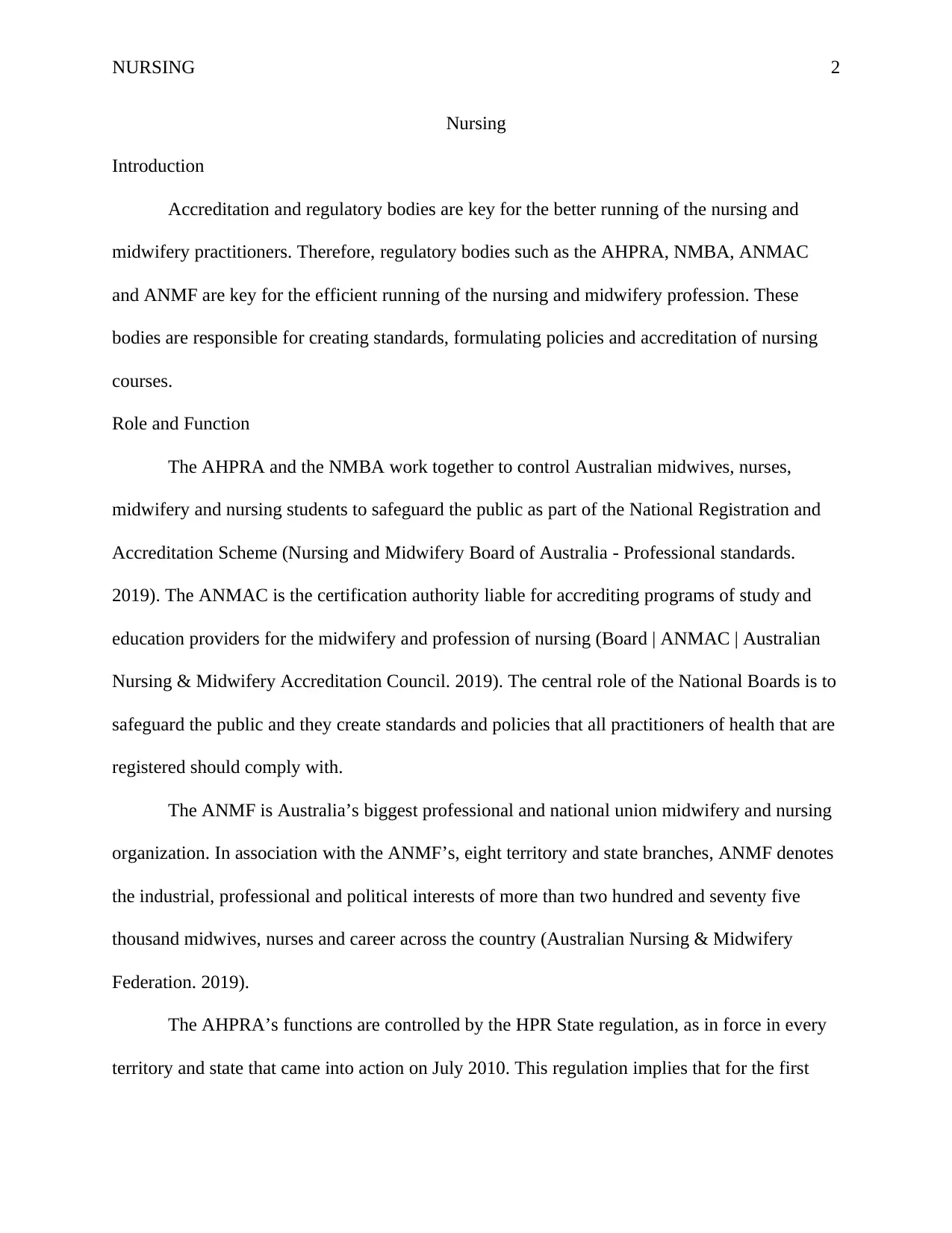
NURSING 2
Nursing
Introduction
Accreditation and regulatory bodies are key for the better running of the nursing and
midwifery practitioners. Therefore, regulatory bodies such as the AHPRA, NMBA, ANMAC
and ANMF are key for the efficient running of the nursing and midwifery profession. These
bodies are responsible for creating standards, formulating policies and accreditation of nursing
courses.
Role and Function
The AHPRA and the NMBA work together to control Australian midwives, nurses,
midwifery and nursing students to safeguard the public as part of the National Registration and
Accreditation Scheme (Nursing and Midwifery Board of Australia - Professional standards.
2019). The ANMAC is the certification authority liable for accrediting programs of study and
education providers for the midwifery and profession of nursing (Board | ANMAC | Australian
Nursing & Midwifery Accreditation Council. 2019). The central role of the National Boards is to
safeguard the public and they create standards and policies that all practitioners of health that are
registered should comply with.
The ANMF is Australia’s biggest professional and national union midwifery and nursing
organization. In association with the ANMF’s, eight territory and state branches, ANMF denotes
the industrial, professional and political interests of more than two hundred and seventy five
thousand midwives, nurses and career across the country (Australian Nursing & Midwifery
Federation. 2019).
The AHPRA’s functions are controlled by the HPR State regulation, as in force in every
territory and state that came into action on July 2010. This regulation implies that for the first
Nursing
Introduction
Accreditation and regulatory bodies are key for the better running of the nursing and
midwifery practitioners. Therefore, regulatory bodies such as the AHPRA, NMBA, ANMAC
and ANMF are key for the efficient running of the nursing and midwifery profession. These
bodies are responsible for creating standards, formulating policies and accreditation of nursing
courses.
Role and Function
The AHPRA and the NMBA work together to control Australian midwives, nurses,
midwifery and nursing students to safeguard the public as part of the National Registration and
Accreditation Scheme (Nursing and Midwifery Board of Australia - Professional standards.
2019). The ANMAC is the certification authority liable for accrediting programs of study and
education providers for the midwifery and profession of nursing (Board | ANMAC | Australian
Nursing & Midwifery Accreditation Council. 2019). The central role of the National Boards is to
safeguard the public and they create standards and policies that all practitioners of health that are
registered should comply with.
The ANMF is Australia’s biggest professional and national union midwifery and nursing
organization. In association with the ANMF’s, eight territory and state branches, ANMF denotes
the industrial, professional and political interests of more than two hundred and seventy five
thousand midwives, nurses and career across the country (Australian Nursing & Midwifery
Federation. 2019).
The AHPRA’s functions are controlled by the HPR State regulation, as in force in every
territory and state that came into action on July 2010. This regulation implies that for the first
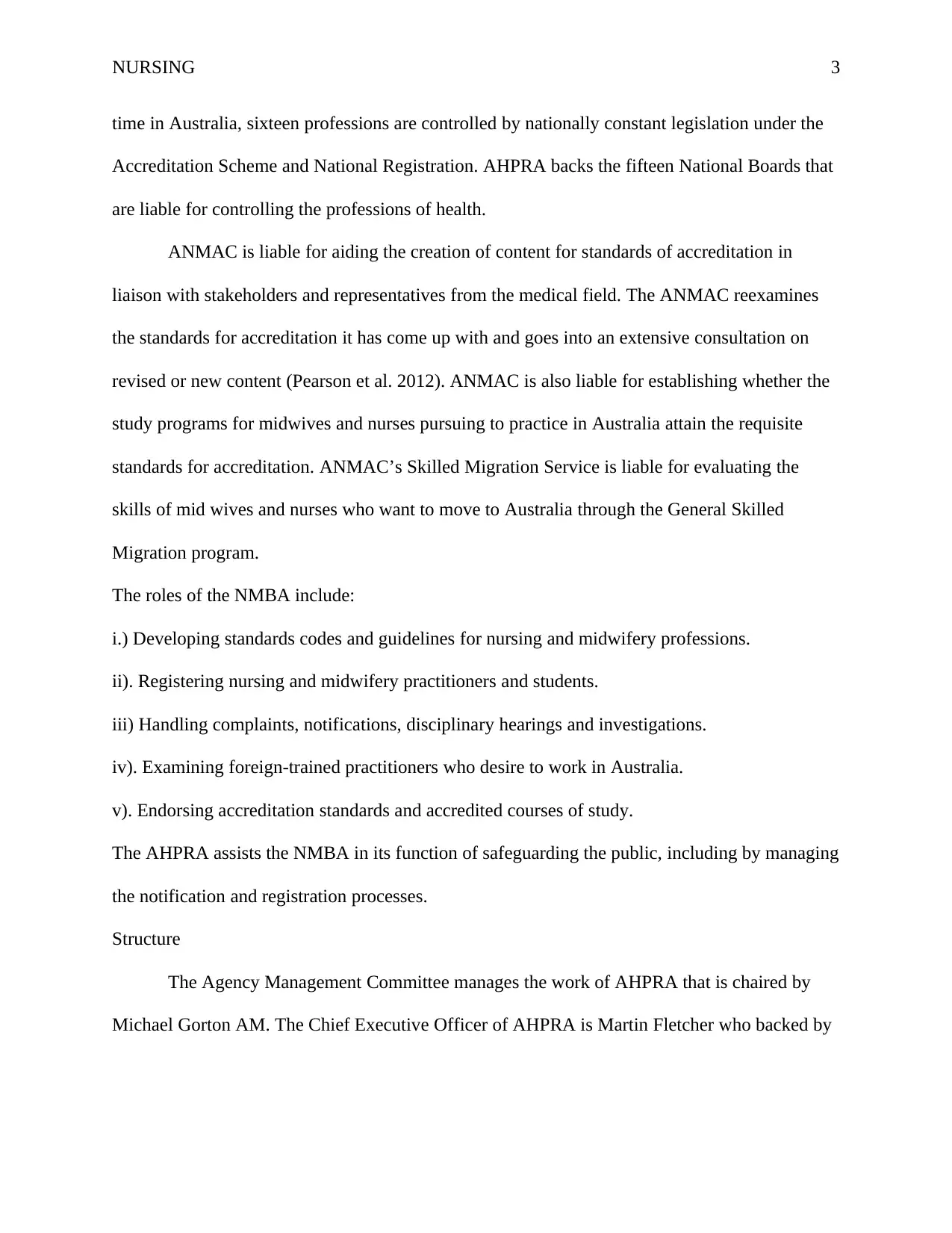
NURSING 3
time in Australia, sixteen professions are controlled by nationally constant legislation under the
Accreditation Scheme and National Registration. AHPRA backs the fifteen National Boards that
are liable for controlling the professions of health.
ANMAC is liable for aiding the creation of content for standards of accreditation in
liaison with stakeholders and representatives from the medical field. The ANMAC reexamines
the standards for accreditation it has come up with and goes into an extensive consultation on
revised or new content (Pearson et al. 2012). ANMAC is also liable for establishing whether the
study programs for midwives and nurses pursuing to practice in Australia attain the requisite
standards for accreditation. ANMAC’s Skilled Migration Service is liable for evaluating the
skills of mid wives and nurses who want to move to Australia through the General Skilled
Migration program.
The roles of the NMBA include:
i.) Developing standards codes and guidelines for nursing and midwifery professions.
ii). Registering nursing and midwifery practitioners and students.
iii) Handling complaints, notifications, disciplinary hearings and investigations.
iv). Examining foreign-trained practitioners who desire to work in Australia.
v). Endorsing accreditation standards and accredited courses of study.
The AHPRA assists the NMBA in its function of safeguarding the public, including by managing
the notification and registration processes.
Structure
The Agency Management Committee manages the work of AHPRA that is chaired by
Michael Gorton AM. The Chief Executive Officer of AHPRA is Martin Fletcher who backed by
time in Australia, sixteen professions are controlled by nationally constant legislation under the
Accreditation Scheme and National Registration. AHPRA backs the fifteen National Boards that
are liable for controlling the professions of health.
ANMAC is liable for aiding the creation of content for standards of accreditation in
liaison with stakeholders and representatives from the medical field. The ANMAC reexamines
the standards for accreditation it has come up with and goes into an extensive consultation on
revised or new content (Pearson et al. 2012). ANMAC is also liable for establishing whether the
study programs for midwives and nurses pursuing to practice in Australia attain the requisite
standards for accreditation. ANMAC’s Skilled Migration Service is liable for evaluating the
skills of mid wives and nurses who want to move to Australia through the General Skilled
Migration program.
The roles of the NMBA include:
i.) Developing standards codes and guidelines for nursing and midwifery professions.
ii). Registering nursing and midwifery practitioners and students.
iii) Handling complaints, notifications, disciplinary hearings and investigations.
iv). Examining foreign-trained practitioners who desire to work in Australia.
v). Endorsing accreditation standards and accredited courses of study.
The AHPRA assists the NMBA in its function of safeguarding the public, including by managing
the notification and registration processes.
Structure
The Agency Management Committee manages the work of AHPRA that is chaired by
Michael Gorton AM. The Chief Executive Officer of AHPRA is Martin Fletcher who backed by
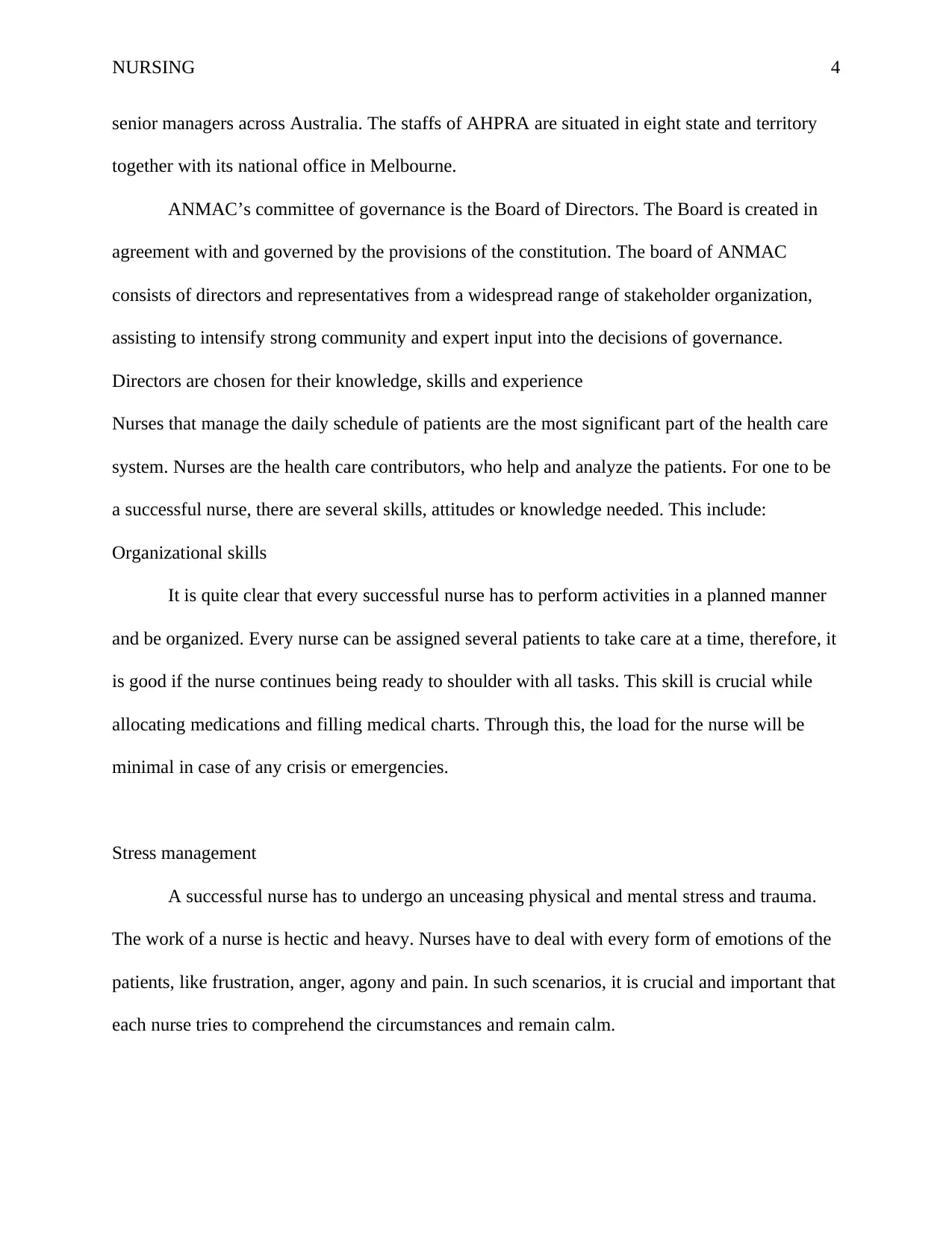
NURSING 4
senior managers across Australia. The staffs of AHPRA are situated in eight state and territory
together with its national office in Melbourne.
ANMAC’s committee of governance is the Board of Directors. The Board is created in
agreement with and governed by the provisions of the constitution. The board of ANMAC
consists of directors and representatives from a widespread range of stakeholder organization,
assisting to intensify strong community and expert input into the decisions of governance.
Directors are chosen for their knowledge, skills and experience
Nurses that manage the daily schedule of patients are the most significant part of the health care
system. Nurses are the health care contributors, who help and analyze the patients. For one to be
a successful nurse, there are several skills, attitudes or knowledge needed. This include:
Organizational skills
It is quite clear that every successful nurse has to perform activities in a planned manner
and be organized. Every nurse can be assigned several patients to take care at a time, therefore, it
is good if the nurse continues being ready to shoulder with all tasks. This skill is crucial while
allocating medications and filling medical charts. Through this, the load for the nurse will be
minimal in case of any crisis or emergencies.
Stress management
A successful nurse has to undergo an unceasing physical and mental stress and trauma.
The work of a nurse is hectic and heavy. Nurses have to deal with every form of emotions of the
patients, like frustration, anger, agony and pain. In such scenarios, it is crucial and important that
each nurse tries to comprehend the circumstances and remain calm.
senior managers across Australia. The staffs of AHPRA are situated in eight state and territory
together with its national office in Melbourne.
ANMAC’s committee of governance is the Board of Directors. The Board is created in
agreement with and governed by the provisions of the constitution. The board of ANMAC
consists of directors and representatives from a widespread range of stakeholder organization,
assisting to intensify strong community and expert input into the decisions of governance.
Directors are chosen for their knowledge, skills and experience
Nurses that manage the daily schedule of patients are the most significant part of the health care
system. Nurses are the health care contributors, who help and analyze the patients. For one to be
a successful nurse, there are several skills, attitudes or knowledge needed. This include:
Organizational skills
It is quite clear that every successful nurse has to perform activities in a planned manner
and be organized. Every nurse can be assigned several patients to take care at a time, therefore, it
is good if the nurse continues being ready to shoulder with all tasks. This skill is crucial while
allocating medications and filling medical charts. Through this, the load for the nurse will be
minimal in case of any crisis or emergencies.
Stress management
A successful nurse has to undergo an unceasing physical and mental stress and trauma.
The work of a nurse is hectic and heavy. Nurses have to deal with every form of emotions of the
patients, like frustration, anger, agony and pain. In such scenarios, it is crucial and important that
each nurse tries to comprehend the circumstances and remain calm.
Secure Best Marks with AI Grader
Need help grading? Try our AI Grader for instant feedback on your assignments.
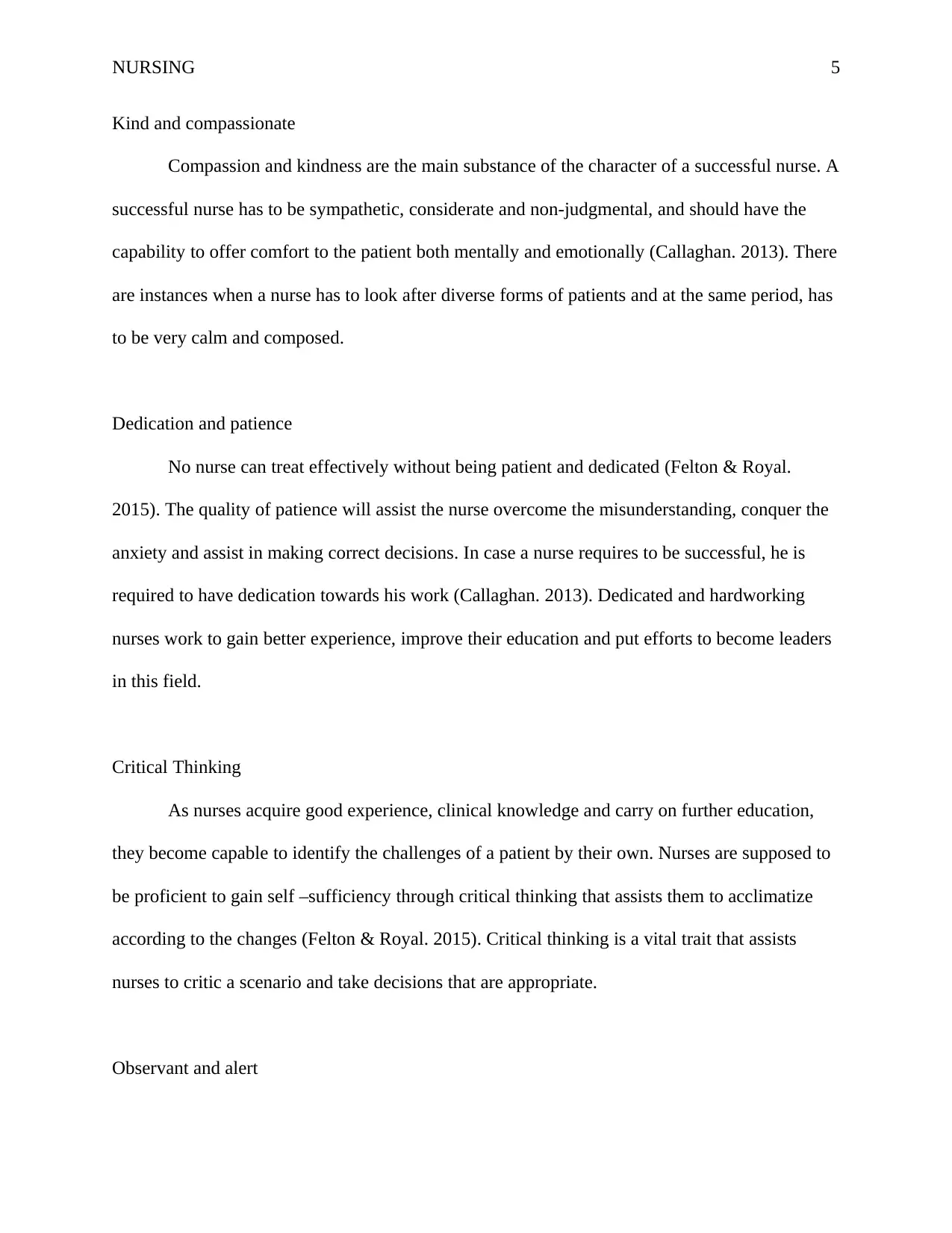
NURSING 5
Kind and compassionate
Compassion and kindness are the main substance of the character of a successful nurse. A
successful nurse has to be sympathetic, considerate and non-judgmental, and should have the
capability to offer comfort to the patient both mentally and emotionally (Callaghan. 2013). There
are instances when a nurse has to look after diverse forms of patients and at the same period, has
to be very calm and composed.
Dedication and patience
No nurse can treat effectively without being patient and dedicated (Felton & Royal.
2015). The quality of patience will assist the nurse overcome the misunderstanding, conquer the
anxiety and assist in making correct decisions. In case a nurse requires to be successful, he is
required to have dedication towards his work (Callaghan. 2013). Dedicated and hardworking
nurses work to gain better experience, improve their education and put efforts to become leaders
in this field.
Critical Thinking
As nurses acquire good experience, clinical knowledge and carry on further education,
they become capable to identify the challenges of a patient by their own. Nurses are supposed to
be proficient to gain self –sufficiency through critical thinking that assists them to acclimatize
according to the changes (Felton & Royal. 2015). Critical thinking is a vital trait that assists
nurses to critic a scenario and take decisions that are appropriate.
Observant and alert
Kind and compassionate
Compassion and kindness are the main substance of the character of a successful nurse. A
successful nurse has to be sympathetic, considerate and non-judgmental, and should have the
capability to offer comfort to the patient both mentally and emotionally (Callaghan. 2013). There
are instances when a nurse has to look after diverse forms of patients and at the same period, has
to be very calm and composed.
Dedication and patience
No nurse can treat effectively without being patient and dedicated (Felton & Royal.
2015). The quality of patience will assist the nurse overcome the misunderstanding, conquer the
anxiety and assist in making correct decisions. In case a nurse requires to be successful, he is
required to have dedication towards his work (Callaghan. 2013). Dedicated and hardworking
nurses work to gain better experience, improve their education and put efforts to become leaders
in this field.
Critical Thinking
As nurses acquire good experience, clinical knowledge and carry on further education,
they become capable to identify the challenges of a patient by their own. Nurses are supposed to
be proficient to gain self –sufficiency through critical thinking that assists them to acclimatize
according to the changes (Felton & Royal. 2015). Critical thinking is a vital trait that assists
nurses to critic a scenario and take decisions that are appropriate.
Observant and alert
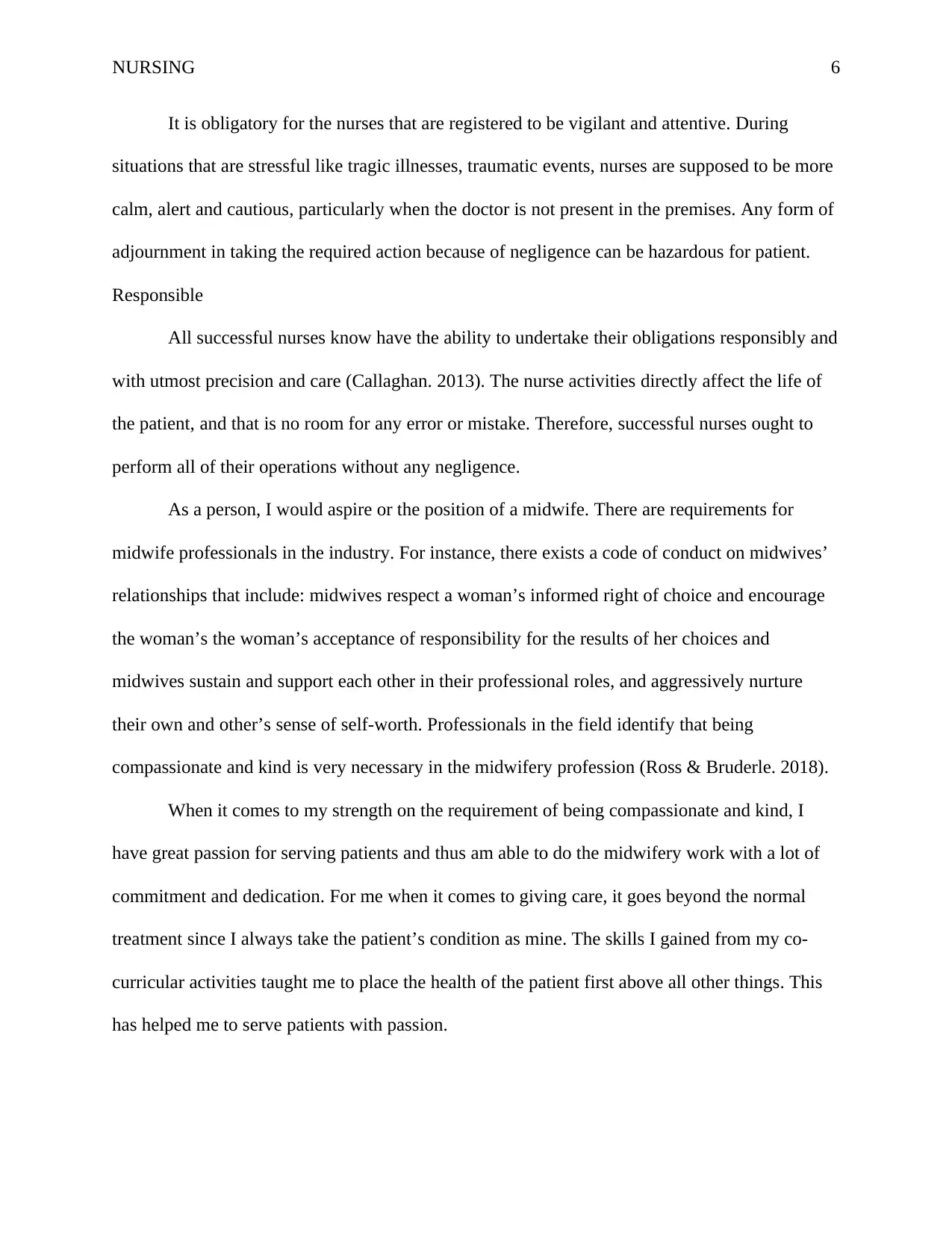
NURSING 6
It is obligatory for the nurses that are registered to be vigilant and attentive. During
situations that are stressful like tragic illnesses, traumatic events, nurses are supposed to be more
calm, alert and cautious, particularly when the doctor is not present in the premises. Any form of
adjournment in taking the required action because of negligence can be hazardous for patient.
Responsible
All successful nurses know have the ability to undertake their obligations responsibly and
with utmost precision and care (Callaghan. 2013). The nurse activities directly affect the life of
the patient, and that is no room for any error or mistake. Therefore, successful nurses ought to
perform all of their operations without any negligence.
As a person, I would aspire or the position of a midwife. There are requirements for
midwife professionals in the industry. For instance, there exists a code of conduct on midwives’
relationships that include: midwives respect a woman’s informed right of choice and encourage
the woman’s the woman’s acceptance of responsibility for the results of her choices and
midwives sustain and support each other in their professional roles, and aggressively nurture
their own and other’s sense of self-worth. Professionals in the field identify that being
compassionate and kind is very necessary in the midwifery profession (Ross & Bruderle. 2018).
When it comes to my strength on the requirement of being compassionate and kind, I
have great passion for serving patients and thus am able to do the midwifery work with a lot of
commitment and dedication. For me when it comes to giving care, it goes beyond the normal
treatment since I always take the patient’s condition as mine. The skills I gained from my co-
curricular activities taught me to place the health of the patient first above all other things. This
has helped me to serve patients with passion.
It is obligatory for the nurses that are registered to be vigilant and attentive. During
situations that are stressful like tragic illnesses, traumatic events, nurses are supposed to be more
calm, alert and cautious, particularly when the doctor is not present in the premises. Any form of
adjournment in taking the required action because of negligence can be hazardous for patient.
Responsible
All successful nurses know have the ability to undertake their obligations responsibly and
with utmost precision and care (Callaghan. 2013). The nurse activities directly affect the life of
the patient, and that is no room for any error or mistake. Therefore, successful nurses ought to
perform all of their operations without any negligence.
As a person, I would aspire or the position of a midwife. There are requirements for
midwife professionals in the industry. For instance, there exists a code of conduct on midwives’
relationships that include: midwives respect a woman’s informed right of choice and encourage
the woman’s the woman’s acceptance of responsibility for the results of her choices and
midwives sustain and support each other in their professional roles, and aggressively nurture
their own and other’s sense of self-worth. Professionals in the field identify that being
compassionate and kind is very necessary in the midwifery profession (Ross & Bruderle. 2018).
When it comes to my strength on the requirement of being compassionate and kind, I
have great passion for serving patients and thus am able to do the midwifery work with a lot of
commitment and dedication. For me when it comes to giving care, it goes beyond the normal
treatment since I always take the patient’s condition as mine. The skills I gained from my co-
curricular activities taught me to place the health of the patient first above all other things. This
has helped me to serve patients with passion.
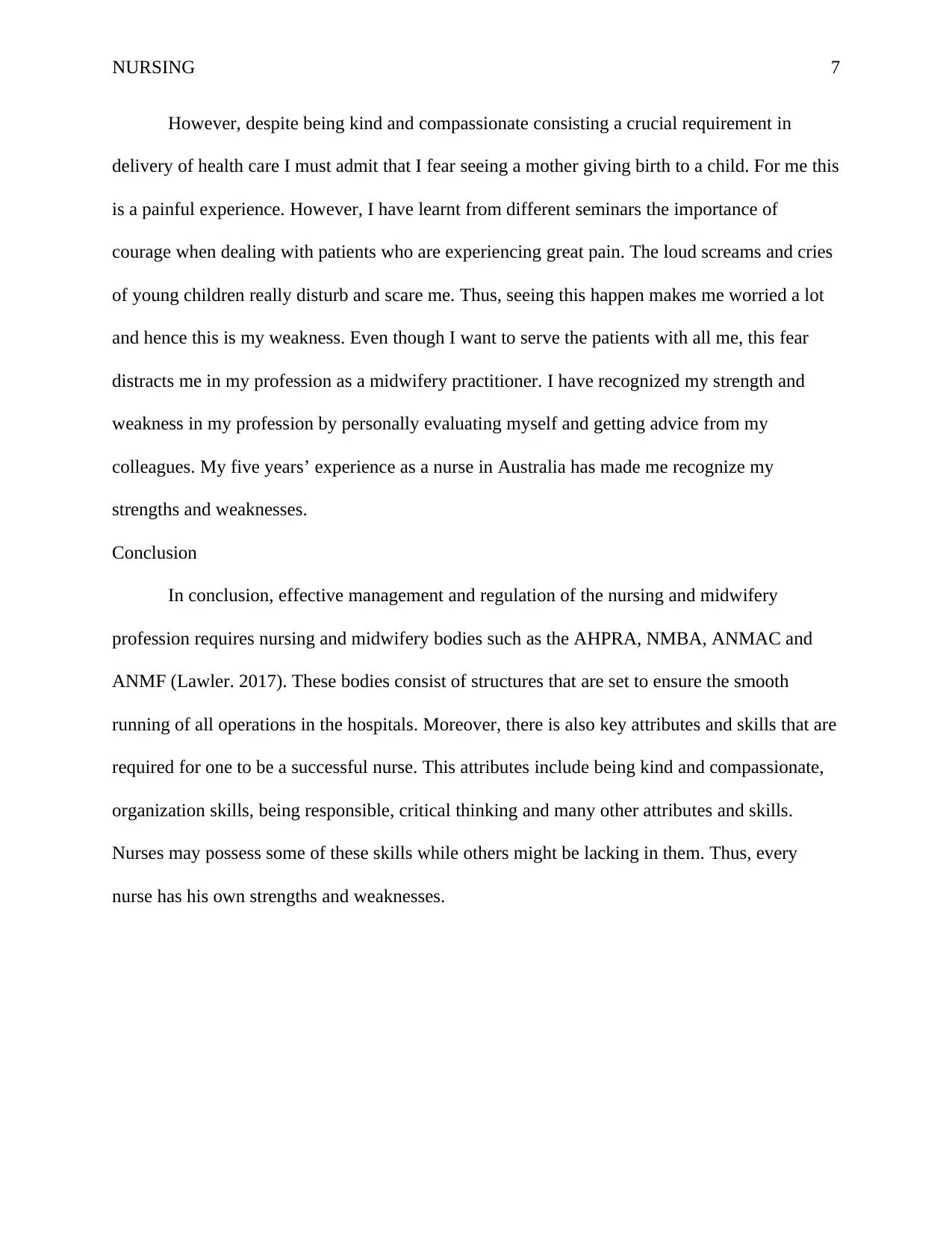
NURSING 7
However, despite being kind and compassionate consisting a crucial requirement in
delivery of health care I must admit that I fear seeing a mother giving birth to a child. For me this
is a painful experience. However, I have learnt from different seminars the importance of
courage when dealing with patients who are experiencing great pain. The loud screams and cries
of young children really disturb and scare me. Thus, seeing this happen makes me worried a lot
and hence this is my weakness. Even though I want to serve the patients with all me, this fear
distracts me in my profession as a midwifery practitioner. I have recognized my strength and
weakness in my profession by personally evaluating myself and getting advice from my
colleagues. My five years’ experience as a nurse in Australia has made me recognize my
strengths and weaknesses.
Conclusion
In conclusion, effective management and regulation of the nursing and midwifery
profession requires nursing and midwifery bodies such as the AHPRA, NMBA, ANMAC and
ANMF (Lawler. 2017). These bodies consist of structures that are set to ensure the smooth
running of all operations in the hospitals. Moreover, there is also key attributes and skills that are
required for one to be a successful nurse. This attributes include being kind and compassionate,
organization skills, being responsible, critical thinking and many other attributes and skills.
Nurses may possess some of these skills while others might be lacking in them. Thus, every
nurse has his own strengths and weaknesses.
However, despite being kind and compassionate consisting a crucial requirement in
delivery of health care I must admit that I fear seeing a mother giving birth to a child. For me this
is a painful experience. However, I have learnt from different seminars the importance of
courage when dealing with patients who are experiencing great pain. The loud screams and cries
of young children really disturb and scare me. Thus, seeing this happen makes me worried a lot
and hence this is my weakness. Even though I want to serve the patients with all me, this fear
distracts me in my profession as a midwifery practitioner. I have recognized my strength and
weakness in my profession by personally evaluating myself and getting advice from my
colleagues. My five years’ experience as a nurse in Australia has made me recognize my
strengths and weaknesses.
Conclusion
In conclusion, effective management and regulation of the nursing and midwifery
profession requires nursing and midwifery bodies such as the AHPRA, NMBA, ANMAC and
ANMF (Lawler. 2017). These bodies consist of structures that are set to ensure the smooth
running of all operations in the hospitals. Moreover, there is also key attributes and skills that are
required for one to be a successful nurse. This attributes include being kind and compassionate,
organization skills, being responsible, critical thinking and many other attributes and skills.
Nurses may possess some of these skills while others might be lacking in them. Thus, every
nurse has his own strengths and weaknesses.
Paraphrase This Document
Need a fresh take? Get an instant paraphrase of this document with our AI Paraphraser
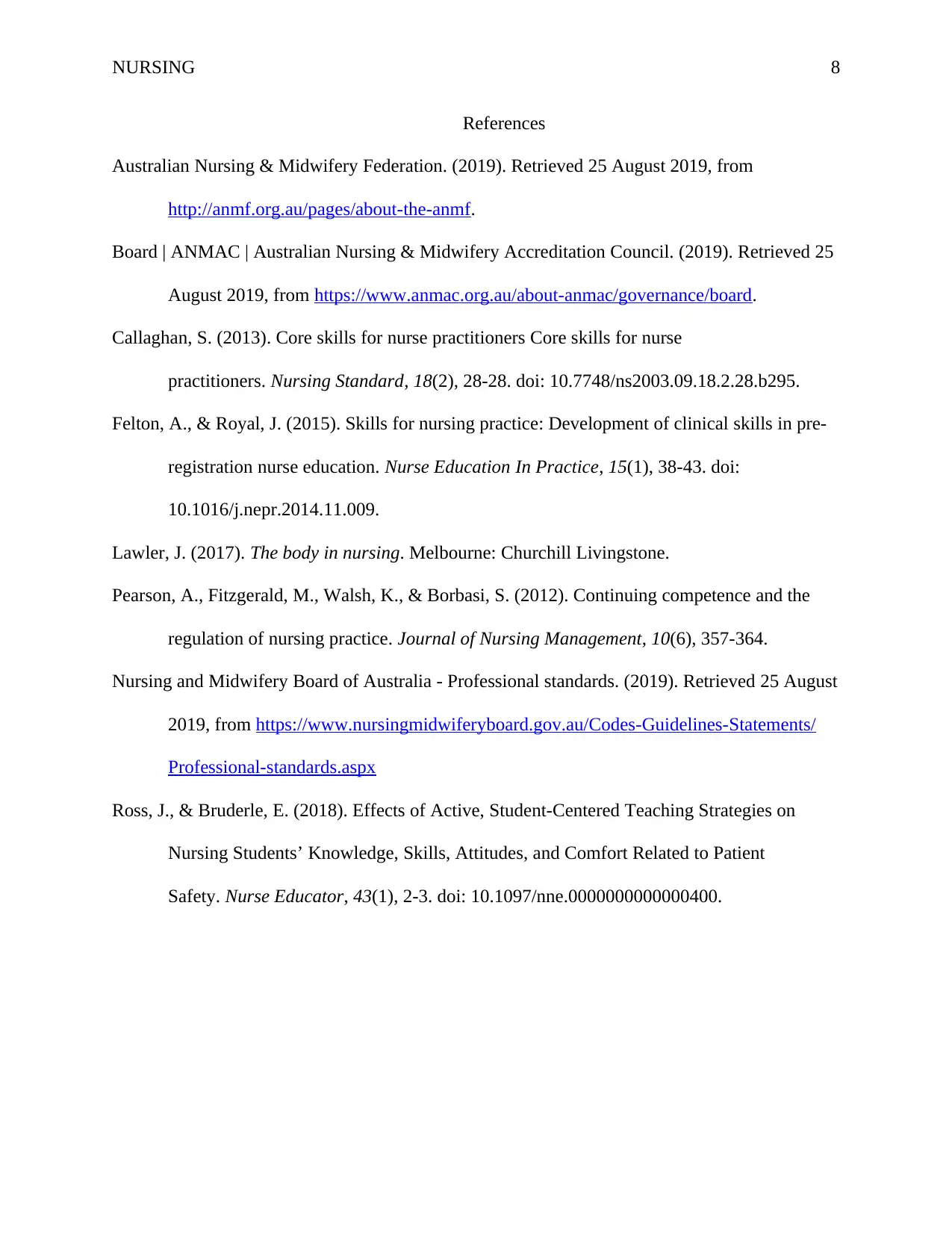
NURSING 8
References
Australian Nursing & Midwifery Federation. (2019). Retrieved 25 August 2019, from
http://anmf.org.au/pages/about-the-anmf.
Board | ANMAC | Australian Nursing & Midwifery Accreditation Council. (2019). Retrieved 25
August 2019, from https://www.anmac.org.au/about-anmac/governance/board.
Callaghan, S. (2013). Core skills for nurse practitioners Core skills for nurse
practitioners. Nursing Standard, 18(2), 28-28. doi: 10.7748/ns2003.09.18.2.28.b295.
Felton, A., & Royal, J. (2015). Skills for nursing practice: Development of clinical skills in pre-
registration nurse education. Nurse Education In Practice, 15(1), 38-43. doi:
10.1016/j.nepr.2014.11.009.
Lawler, J. (2017). The body in nursing. Melbourne: Churchill Livingstone.
Pearson, A., Fitzgerald, M., Walsh, K., & Borbasi, S. (2012). Continuing competence and the
regulation of nursing practice. Journal of Nursing Management, 10(6), 357-364.
Nursing and Midwifery Board of Australia - Professional standards. (2019). Retrieved 25 August
2019, from https://www.nursingmidwiferyboard.gov.au/Codes-Guidelines-Statements/
Professional-standards.aspx
Ross, J., & Bruderle, E. (2018). Effects of Active, Student-Centered Teaching Strategies on
Nursing Students’ Knowledge, Skills, Attitudes, and Comfort Related to Patient
Safety. Nurse Educator, 43(1), 2-3. doi: 10.1097/nne.0000000000000400.
References
Australian Nursing & Midwifery Federation. (2019). Retrieved 25 August 2019, from
http://anmf.org.au/pages/about-the-anmf.
Board | ANMAC | Australian Nursing & Midwifery Accreditation Council. (2019). Retrieved 25
August 2019, from https://www.anmac.org.au/about-anmac/governance/board.
Callaghan, S. (2013). Core skills for nurse practitioners Core skills for nurse
practitioners. Nursing Standard, 18(2), 28-28. doi: 10.7748/ns2003.09.18.2.28.b295.
Felton, A., & Royal, J. (2015). Skills for nursing practice: Development of clinical skills in pre-
registration nurse education. Nurse Education In Practice, 15(1), 38-43. doi:
10.1016/j.nepr.2014.11.009.
Lawler, J. (2017). The body in nursing. Melbourne: Churchill Livingstone.
Pearson, A., Fitzgerald, M., Walsh, K., & Borbasi, S. (2012). Continuing competence and the
regulation of nursing practice. Journal of Nursing Management, 10(6), 357-364.
Nursing and Midwifery Board of Australia - Professional standards. (2019). Retrieved 25 August
2019, from https://www.nursingmidwiferyboard.gov.au/Codes-Guidelines-Statements/
Professional-standards.aspx
Ross, J., & Bruderle, E. (2018). Effects of Active, Student-Centered Teaching Strategies on
Nursing Students’ Knowledge, Skills, Attitudes, and Comfort Related to Patient
Safety. Nurse Educator, 43(1), 2-3. doi: 10.1097/nne.0000000000000400.
1 out of 8
Related Documents
Your All-in-One AI-Powered Toolkit for Academic Success.
+13062052269
info@desklib.com
Available 24*7 on WhatsApp / Email
![[object Object]](/_next/static/media/star-bottom.7253800d.svg)
Unlock your academic potential
© 2024 | Zucol Services PVT LTD | All rights reserved.





